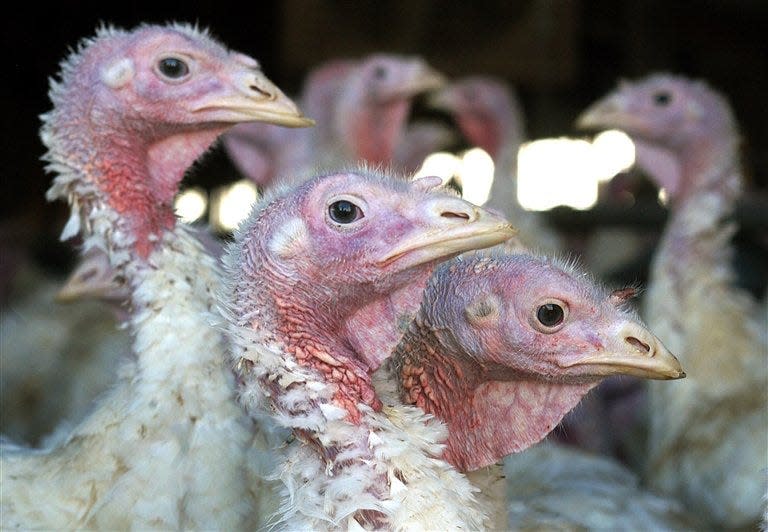Bird owners urged to protect flocks after avian influenza detected in wild, domestic birds
Bird owners in Michigan are urged to protect their flocks and reduce the spread of highly pathogenic avian influenza after wild and domestic birds have died of the virus in the state, with domestic parrots at a Washtenaw County residence the latest victims of the disease.
State and federal officials have detected the presence of highly pathogenic avian influenza (HPAI) in recent weeks in Michigan's Lower and Upper Peninsulas.

Here's where they said the highly contagious and potentially deadly virus has been detected:
Parrots at a Washtenaw County residence. The parrots succumbed to the virus, and state officials are working with the owners to finalize a flock plan to prevent further spread of the disease.
Non-commercial backyard poultry flock from Livingston County. The flock contained about 20 birds of multiple species.
Non-commercial backyard flock from Menominee County, the first in the Upper Peninsula to detect the virus.
Non-commercial backyard flock from Macomb County. Testing was done after several birds died and others showed signs of illness.
Two snowy owls from Macomb County
Mute swan from Monroe County
Six free-ranging Canada geese and two tundra swans from St. Clair Flats State Wildlife Area in St. Clair County
Non-commercial backyard poultry flock in Kalamazoo County, Michigan's first HPAI detection in late February. Testing was done after several birds died and others showed signs of illness.
In February, the Detroit Zoo proactively moved the majority of its birds indoors to protect them from avian influenza after the disease was confirmed in Kalamazoo County and zoo officials said similar infections had been reported across the U.S.
More: Detroit Zoo moving birds indoors after avian virus was detected in Michigan
More: Detroit Zoo penguin exhibit got 2nd snow machine, more viewing spaces in upgrades
The birds included flamingos, ostrich, cassowary, sandhill cranes, all birds housed in the Matilda R. Wilson Free-Flight Aviary and peafowl that roam the zoo. The Polk Penguin Conservation Center remained open to the public, in part because it has separate air handling systems for birds and zoo visitors.

“No matter what bird species or how many birds one owns — now is the time to protect them. Bird owners need to take every strategy to protect their flocks and reduce the spread of HPAI within our state," said Dr. Nora Wineland, the state's veterinarian.
Avian influenza can be spread from flock to flock, including by wild birds, through contact with infected poultry, by equipment and on the clothing and shoes of caretakers, state officials said.
Thirty-two states have had HPAI detections in wild birds this year, according to the U.S. Department of Agriculture Animal and Plant Health Inspection Service. It said wild birds can carry the disease to new areas while migrating, potentially exposing domestic poultry to the virus, and it anticipates more avian influenza detections in additional states as wild bird surveillance continues into the spring.
More than two dozen states reported confirmations of avian influenza in commercial and backyard flocks this year.
More: DNR confirms avian flu in wild birds in Macomb, 2 other counties
Last month, the Michigan Department of Natural Resources announced HPAI in the wild bird population when it said the disease was identified in the snowy owls, mute swan, Canada geese and tundra swans in metro Detroit.
The U.S. Centers for Disease Control and Prevention said last month "the risk to the general public’s health from current H5N1 bird flu viruses is low, however some people may have job-related or recreational exposures to birds that put them at higher risk of infection."
The CDC said the current situation "is primarily an animal health issue" and that "no human infections with H5N1 bird flu viruses have ever been identified in the U.S."
The Washtenaw County Health Department said HPAI in birds is not a food safety concern and people cannot get the virus by eating properly cooked poultry products.
State officials said pet birds that live in a family home are unlikely to have any contact with wild birds and their only contact with contaminated material could be indirectly through exposed food, cage furniture or an owner’s clothing.
They said residents with pet birds should not store food or water bowls where wild birds roost or fly, and they should disinfect or change shoes, clothing and other items if they have been worn off the property. Wineland said not to introduce any material, food or clothing that wild birds may have contaminated.
More: Study: Ohio deer found infected with COVID-19: Why 'this changes the game' on pandemic
More: Mink at Michigan farm test positive for virus that causes COVID-19
Non-commercial backyard flocks in Michigan where avian influenza has been detected are under quarantine; and the birds have been depopulated to prevent further spread of the disease, according to the Michigan Department of Agriculture and Rural Development.
There are no anticipated disruptions to supply chains and no threat to public health or food safety from the virus detections in these flocks.
State officials provided steps to protect the health of Michigan's domestic birds:
Prevent contact between domestic and wild birds by bringing them indoors or ensuring their outdoor area is fully enclosed.
Wash your hands before and after handling birds and when moving between different coops.
Disinfect boots, other gear when moving between coops.
Don't share equipment, supplies between coops or other farms.
Clean and disinfect equipment, supplies between uses. If something cannot be disinfected, discard it.
Use well or municipal water as drinking water for birds.
Keep poultry feed secure to ensure there is no contact between the feed/feed ingredients and wild birds or rodents.
Watch for unusual deaths, a drop in egg production, a significant decrease in water consumption or an increase in sick birds.
Call the state Department of Agriculture and Rural Development immediately if avian influenza is suspected at 800-292-3939 during the day or 517-373-0440 after hours.
Residents who notice the death of three or more free-ranging birds should report that to the state Department of Natural Resources through the Eyes in the Field app or by calling 517-336-5030. For more information, go to Michigan.gov/BirdFlu.
Contact Christina Hall: chall@freepress.com. Follow her on Twitter: @challreporter.
Support local journalism. Subscribe to the Free Press.
This article originally appeared on Detroit Free Press: Bird owners urged to protect flocks, reduce spread of avian influenza

